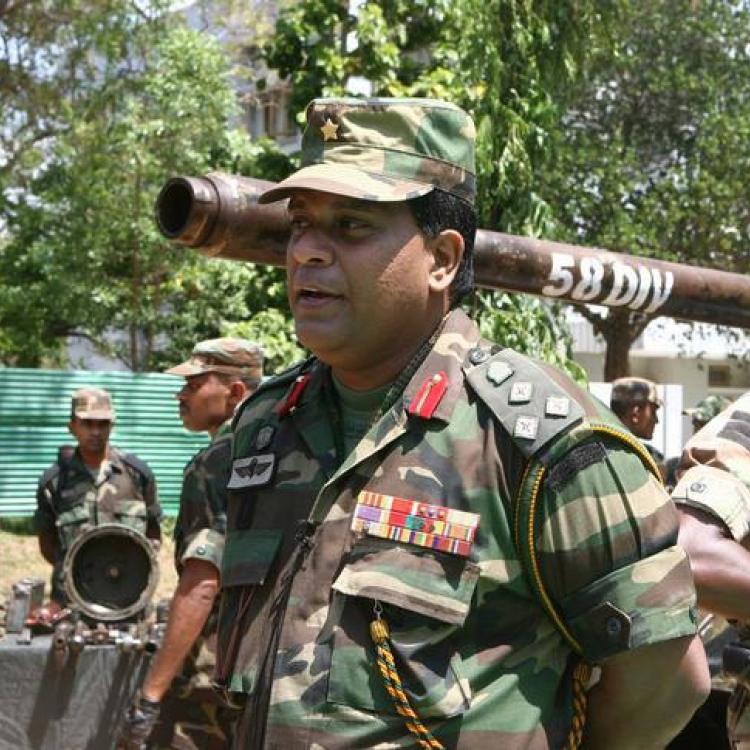.jpg)
Sri Lankan politicians have placed blame on the Tamil diaspora after the UK government announced sanctions against four individuals implicated in serious human rights violations.
Yesterday, the UK government announced that it had placed sanctions in the form of asset freezes and travel bans on senior figures from the Sri Lankan military and a government-affiliated paramilitary group for their involvement in crimes such as extrajudicial killings.
Those sanctioned are Shavendra Silva, former Head of the Sri Lankan Armed Forces, Wasantha Karannagoda, former Navy Commander, Jagath Jayasuriya, former Commander of the Sri Lankan Army and Vinayagamoorthy Muralitharan, also known as Karuna Amman, who led the pro-government Karuna Group, a paramilitary unit that operated in collaboration with the Sri Lankan military.
Various Sri Lankan politicians have denounced the sanctions claiming that they were a result of lobbying by the Tamil diaspora.
Namal Rajapaksa, son of accused war criminal Mahinda Rajapaksa, claimed on X that the sanctions were not about human rights but were “the result of relentless LTTE-backed lobbying.”
Sri Lanka was the first nation to fully defeat terrorism, yet the West continues to selectively target our war veterans while ignoring those who funded and justified LTTE brutality. The latest UK sanctions aren’t about human rights—they’re the result of relentless LTTE-backed…
— Namal Rajapaksa (@RajapaksaNamal) March 25, 2025
“This is not justice; some Western politicians are enjoying the perks of lobbying money, putting our nation’s reconciliation at risk,” he added.
Reacting to the sanctions, former Foreign Minister Ali Sabry said that “the separatist diaspora is more active than ever strategic, vocal, and persistent.”
UK sanctions of our war heroes !
— M U M Ali Sabry (@alisabrypc) March 24, 2025
None of these developments occur in a vacuum. The separatist diaspora is more active than ever strategic, vocal, and persistent.
It is deeply regrettable that some of our own politicians, whether by choice, design, or sheer ignorance, end up… pic.twitter.com/8iDt1JUV8d
Sabry went on to add that “Sri Lanka must remain a unitary state” and that the country should preserve their “sovereignty and territorial integrity”.
Sarath Weerasekara, Sri Lanka’s former Public Security Minister also condemned the sanctions, stating that the UK government has “let down her entire nation and her policy in fighting terrorists for votes and funds.”
We outrightly condemn t #British Gov's action re sanctions imposed on #SriLanka's military commanders.
— Sarath Weerasekera (@ReAdSarath) March 25, 2025
This is a clear violation of Additional Protocol II of t Common Article 3 of t Geneva Convention which clearly mentions t Penal Prosecution procedure dealing w/ prosecuting 👇🏽
Dilith Jayaweera, a Sarvajan Balaya MP, said the sanctions were a "shocking move" by the UK government which he claims is "rooted in misinformation". Jayaweera also stated that the Sri Lankan military leaders "played a pivotal role in ending a brutal terrorist conflict".
I am deeply surprised and disappointed by the Government of Sri Lanka’s lackluster response to the United Kingdom’s unfounded decision to impose sanctions on three of our most distinguished military leaders—General Shavendra Silva, Admiral of the Fleet Wasantha Karannagoda, and…
— Dilith Jayaweera (@Dilith_J) March 25, 2025
Successive Sri Lankan governments have consistently denied accusations of human rights abuses that were committed throughout the armed conflict and particularly when Sri Lanka’s forces launched their final military offensive in September 2008 until May 2009.
During this final phase of the conflict, the Sri Lankan military deliberately shelled government designated ‘No Fire Zones’, shelled hospitals and food distribution lines, physically and sexually tortured Tamil men and women and restricted access of food and medicines into the Vanni.
By examining different sources, including the United Nations, census figures and World Bank data, the International Truth and Justice Project (ITJP) found that the highest estimate of those killed during that final phase could be as large as 169,796.
Tamils in the homeland and the diaspora have been calling on the international community to refer Sri Lanka to the International Criminal Court for the Mullivaikkal genocide.

